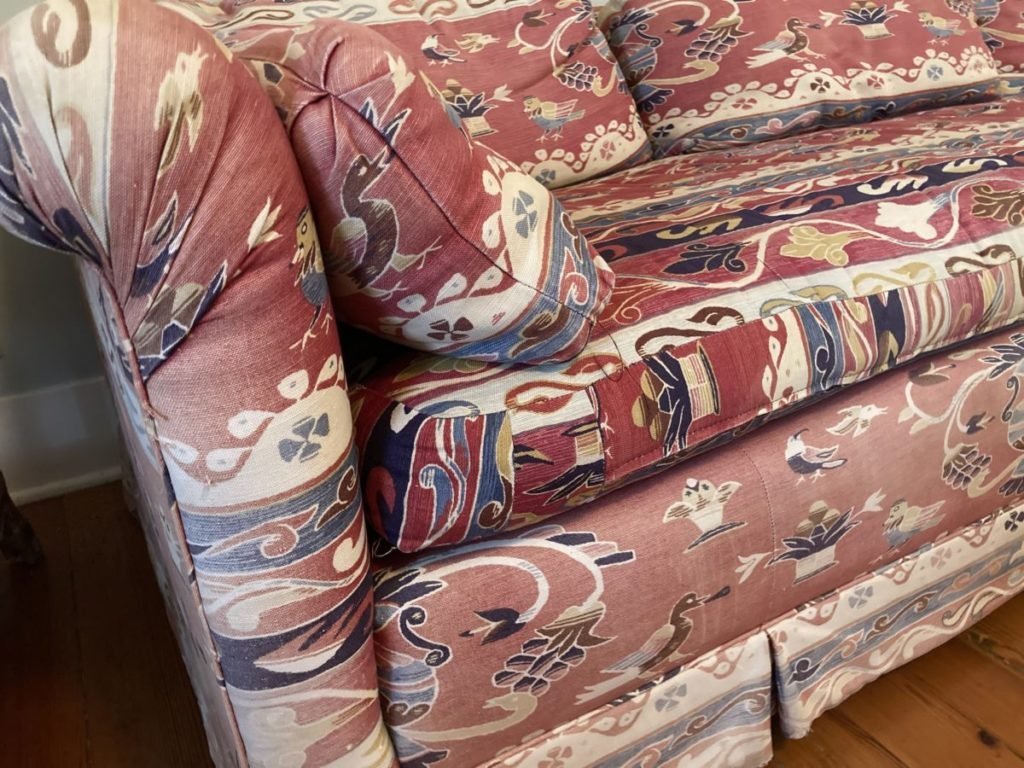
When I was thirteen, my mother left us. It was on a Sunday and she knew that Daddy, my brothers and I were away, visiting a family out on the old Nashville road. A moving van pulled up to the duplex and my mother emptied the rooms. Excited by the drama, neighbors watched from their front yards.
My mother ‘stole’ the large Heriz oriental rug, the twisty verdigris wrought iron table, the African basket lamps in moss green linen shades—my friends had never seen such lamps. The hand-embroidered pillows, magenta and orange molas sewn by indiginous people—colors and designs not found in the pale and pastel homes of white Memphis.
In The Cost of Living, Deborah Levy writes, “To unmake a family home is like breaking a clock. So much time has passed through all the dimensions of that house.”
“Broken home,” the popular term during the Fifties, early Sixties, was one thing, but the loss of the furnishings, imbued with her spirit, the loss of time that we had lived wrestling on the rug, reading Huckleberry Finn, snuggling in bright pillows, diminished me in ways I did not understand. To remain living in rooms that have been stripped of our time lived there untethered and confused me.
Katha Pollit’s poem, the first two stanzas, captures the animate lives of objects (New Yorker, Jan. 31, 2022).
Brown Furniture
Don’t throw out that old chair!
Someone said yes there,
listened to Brahms while it rained,
fell asleep over “Das Kapital,”
told a small child about King Alfred and the cakes.
Don’t be fooled by the dining table,
discreetly silent under its green cloth.
Momentous events occurred there,
all of which it remembers perfectly.
A terrible silence was broken over cake,
and three aunts sang a song about Romania.
Not your aunts? Not important. They were there.
A few years later, Daddy and my grandmother (my mother’s mother) chased after my mother. They did not find her, but retrieved the furniture from a storage bin in Arkansas.
Now this is the weird part.
In my mind, the furniture never came back, never re-inhabited our home, in spite of Daddy bringing it back. In my memory, the duplex remained impoverished, colorless, and shabby, as it was after she left us. It was only years later when I ran across an old photograph of me in my high school cap and gown. There I was, smiling, standing on my mother’s Oriental rug!
I had been living with the furnishings for several years, but had imagined them gone. When I saw that photo, I was stunned that my memory had deceived me so.
Before discovering the photo, I pictured the cheap greenish-gray carpet Daddy lugged home from Sears after she left. The inner life of those objects, their energy, their colors no longer resonated with me. In the Poetics of Space, Gaston Bauchelard notes, “the Mother image and the House image are united.”
Now, I see that I’ve become side-tracked.
I want to write about Pollit’s poem—the layers of time, of family history inhabiting objects.
I want to make a case for why I can’t throw away the faded red sofa in the upstairs bedroom. The sofa is missing a leg and propped up by a log, fortunately unseen, under the sofa’s skirt.
I met this sofa in the Hollywood Hills. I was sitting on the sofa when I first realized I was in love. Later I upholstered the sofa in a red Peruvian print and the sofa lived in our son’s room in Topanga Canyon; the morning sun streaked through French doors, fading the red wings of the Peruvian birds.
How can I throw away that moment when I knew I was in love? Or forget my young son’s sunny room in the canyon, or the glasses of red wine my husband and I drank, sitting on this very same sofa in the large drafty kitchen where I screamed at him every night for moving us to a dilapidated Virginia farm house, in the ‘middle of nowhere.’
The sofa remembers perfectly.

Share this post with your friends.

